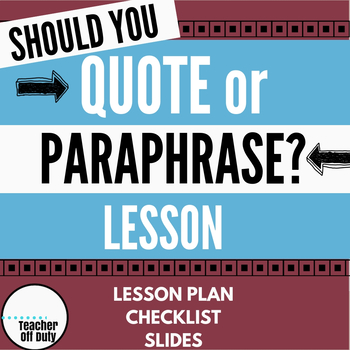Should You Quote or Paraphrase? Lesson
- Zip
Description
This lesson goes beyond defining quotes and paraphrasing and helps students decide whether to quote or paraphrase information they find from other sources. Using a flow-chart, they can use questions to decide why they are including the information (because of the wording? Because of the fact? etc.) to decide whether to quote or paraphrase.
Another handout takes them systematically through the rest of their writing to evaluate how they quoted/paraphrased all their other evidence, and fix it to match their reasons for including it.
A useful lesson for style, logic, and avoiding plagiarism in argumentative writing!
---
**Note**
This lesson is included in the following bundles at a discounted price:
---
While teaching argumentative writing, I found that deciding when to quote or paraphrase was one of the most common errors students made in their writing--and simultaneously one of the most difficult to teach. This lesson plan was a complete break-through for me and my students, and I hope for the same for yours!
This lesson plan includes:
- Content standards
- Language standards
- 1 detailed lesson plan
- 2 editable handouts accompanying the lesson plan
- Powerpoint slides for the lesson
**Note**
This lesson is included in the following bundles at a discounted price:
You may also be interested in these other argumentative writing products:
Bundles:
- Brainstorming and Outlining Bundle (for Argumentative Writing)
- Organization and Structure Bundle (for Argumentative Writing)
- Revising, Editing, and Peer Feedback Pack(for Argumentative Writing)
- Organization and Structure Bundle (for Argumentative Writing)
- Full Argumentative Writing Unit Plan
Individual Lessons:


